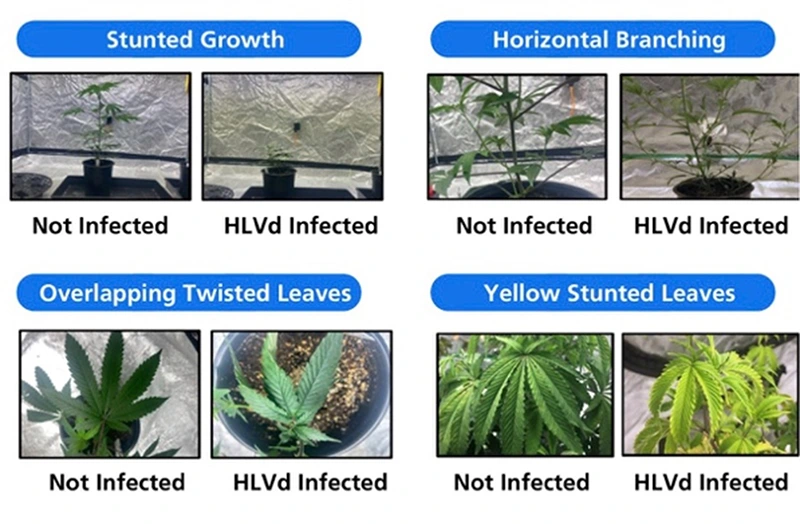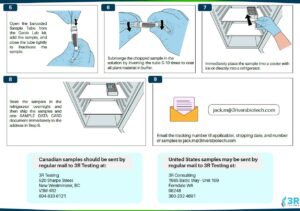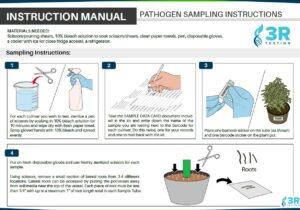FREQUENTLY ASKED QUESTIONS
3R TESTING
During the vegetative stage, plants tend to stay shorter and have smaller leaves, with their branching being more horizontal. Branches and leaves are fragile and may break off easily. As the plants reach the flowering stage, they tend to have smaller and looser buds with fewer trichromes and reduced terpene production. Symptoms to look out for:
- Stunted growth and tighter node spacing.
- Sparse buds with variable trichrome production.
- Smaller and distorted leaves with light lime green coloring at each growing tip.
- Lateral branching.
- Brittle and rubbery stems that easily snap off.

HLVd can spread through infected sap, water, insects, fungi, and seeds. To control the spread of this pathogen, it is essential to isolate healthy propagation material from infected sites. Ensure proper sanitation and conduct frequent testing to determine the degree and extent of infection.
Tool Sterilization – Regular sterilization of tools and equipment is necessary, especially for those used in pruning or trimming, as HLVd can remain infectious for up to eight days. To reduce the transmission risks, it is highly recommended to clean gloves and tools using a 10% bleach solution and soak the tools for at least 60 seconds, followed by a clean water rinse. It is important to note that heat and alcohol are ineffective in killing the viroid, because HLVd is a type of pathogen resistant to these methods due to its unique structure and composition.
Plant Handling – It is essential for people who handle plants to wear protective clothing and gloves to avoid the spread of HLVd. It should be noted that HLVd can remain infectious on human skin for up to three hours and on materials like cotton and leather for over 24 hours. Therefore, taking necessary precautions while handling plants is crucial to prevent infections.
Testing Frequency – Regular pathogen testing is crucial for a healthy cannabis crop. Test mother plants every 4-6 weeks for HLVd. Also, test any new material, including seeds, before entering your facility. Regular testing will help you maintain a disease-free environment and protect your crop.
PCR is considered the most reliable method for detecting pathogen DNA due to its high sensitivity and specificity. It can detect even the smallest amounts of target DNA and distinguish between closely related strains or species, which is particularly useful in cases where low levels of pathogens are present.
Compared to other techniques, such as LAMP, which have lower sensitivity, PCR is less likely to produce false negatives.
All 3R testing is conducted using PCR to ensure that the results are accurate and reliable.
We mail you a complete testing kit with a collection tube and instructions on collecting samples and documenting what plants the samples were collected from.
- For each cultivar you wish to test, sterilize a pair of scissors by soaking in 10% bleach solution for 10 minutes and wipe dry with fresh paper towel. Spray gloved hands with 10% bleach and spread evenly.
- Take the SAMPLE DATA CARD document included in the kit and write down the name of the sample you are testing next to the barcode for each cultivar. Do this twice, one for your records and one to mail back with the kit.
- Place one barcode sticker on the Sample Tube and one barcode sticker on the plant pot.
- Put on fresh disposable gloves and use freshly sterilized scissors for each sample. Using scissors, remove a small section of lateral roots from 3-4 different locations. Lateral roots can be accessed by pulling the pot/vessel away from soil/media near the top of the vessel. Each piece of root must be less than 1/4″ with up to a maximum 1″ of root length total in each Sample Tube.
- Open the barcoded Sample Tube from the 3R Testing kit, add the sample, and close the tube tightly to inactivate the sample.
- Submerge the chopped sample in the solution by inverting the tube 5-10 times to coat all plant material in buffer. Immediately place the sample into a cooler with ice or directly into a refrigerator.
- Store the samples in the refrigerator overnight and then ship the samples and one SAMPLE DATA CARD document immediately to our address.
Our highly efficient testing process allows us to confidently deliver over 90% of our test results within two business days of receiving your samples.
Yes we do! If you suspect your crop is infected with pathogens other than HLVd, we can diagnose that. We can test for a full spectrum of pathogens known to infect plants, including 11 viral pathogens, fungal pathogens Fusarium and Pythium, and Phytophthora.
All tests use precise and accurate PCR technology and the low price point of $15 per test.
TISSUE CULTURE
Plant Tissue Culture (TC) is a sterile laboratory technique utilized for the propagation and cultivation of plants from tiny tissue samples, such as cells, tissues, or organs, in a controlled environment. This controlled environment includes precise conditions of temperature, light, humidity, and nutrient-rich medium. Plant tissue culture is widely employed in plant science and agriculture for various purposes, such as the production of disease-free plants, the multiplication of rare or endangered species, the breeding of new plant varieties, and the study of plant growth and development in controlled settings.
In general, plant tissue culture consists of four key stages:
Initiation: Starts the culture from plant material on a nutrient-rich medium.
Multiplication: Once through the initiation process, this stage promotes tissue growth to increase the plant material.
Rooting: Induces roots in the identified varieties as needed.
Acclimatization: Prepares/hardens plantlets for transfer to natural conditions.
Utilizing Tissue Culture rejuvenates a plant’s genetics, resulting in clonal plants free from the generational changes seen in traditional cloning, such as reduced vigor and yields. This process brings about advantages like enhanced apical dominance, uniform internode spacing, and balanced lateral branching, thanks to the restoration of juvenile vigor.
Utilizing robust genetics and disease-free plants ensures consistency in your plant growth and yields. The reproducibility and precision of TC technologies enable these outcomes to be consistently achieved from one generation to the next and from one harvest to another.
Tissue Culture can play a pivotal role in various stages of your cultivation cycle:
Genetic Restoration: Utilize TC to clean, store, and obtain clean mother plants and revive prized genetics, restoring their original health and vitality.
In-House Tissue Culture Lab: Consider establishing your own TC lab to unlock the full range of benefits this technology offers.
Tissue Culture presents a wide array of versatile technological capabilities, and its full potential is only just beginning to be explored.
The TC technique has multiple benefits. It not only saves space by converting unproductive propagation space into cultivation, but it also produces plants free of pathogens and pests. This is achieve by using sterilized plant tissues and maintaining aseptic conditions throughout the process. Moreover, our plants are healthier due to optimized media, resulting in improved yields and chemical expression, ultimately maximizing your profits.
If you opt for a 3R Solution, you can save on the capital expenditures and ongoing costs. Our services offer seamless integration with your existing infrastructure, reducing costs. We can design a TC lab tailored to your specific needs, and the best part is that we offer this service free of charge. You could have a functional TC lab in your facility with a basic setup for as little as $15,000.
Our flexible solutions can be scaled to meet your monthly needs, ranging from 100 to over a million plants. our basic solution can produce a monthly output of 1,000 plants that can be used in your mother room. Additionally, it allows you to store over 200 different varieties.
We have developed a proven and repeatable process for operating a TC lab, even if you ar unfamiliar with TC. Our proprietary software enforces standard operating procedures to ensure consistent and accurate results. We provide software, training, media, and remotely monitor your process to prevent errors. The best part is you don’t need a science background to operate the TC lab. Most clients repurpose their existing nursery or cultivation personnel for this task.
It is possible to order and install equipment within three weeks. Training your staff will begin using your propagation materials, initiating the process.
Assuming the incoming material is disease-free, the plants can undergo the process in as little as two months.
Our basic laboratory package starts at only $5,000 per month. This package includes all our proven solutions, including setup assistance, training, media, remote monitoring, ongoing support, and upgrades. With this package, you will receive the best-in-class solutions and technical expertise for the equivalent of a managers salary. If you require more detailed pricing information, please do not hesitate to contact a 3R representative, who will gladly assist you.

